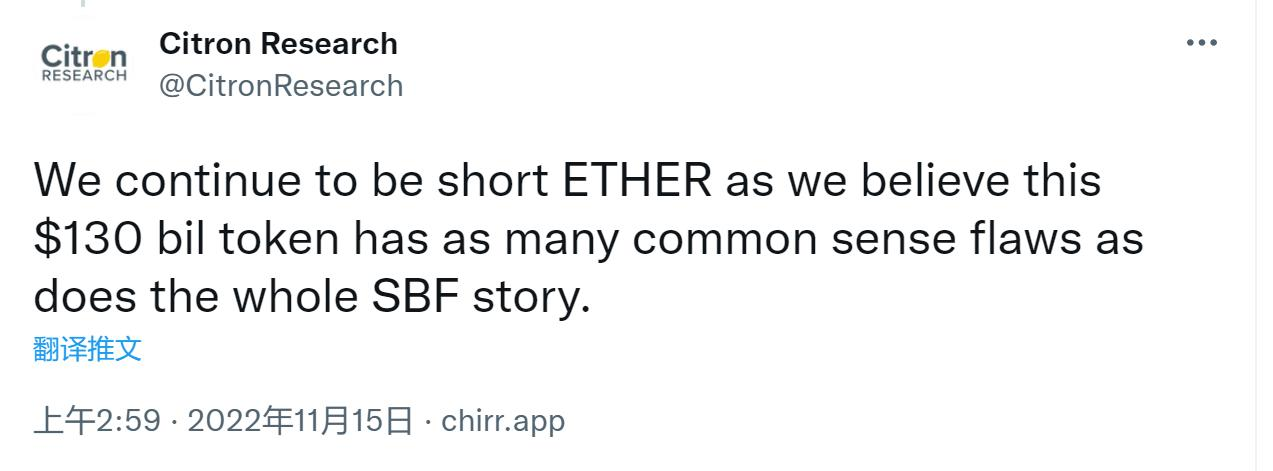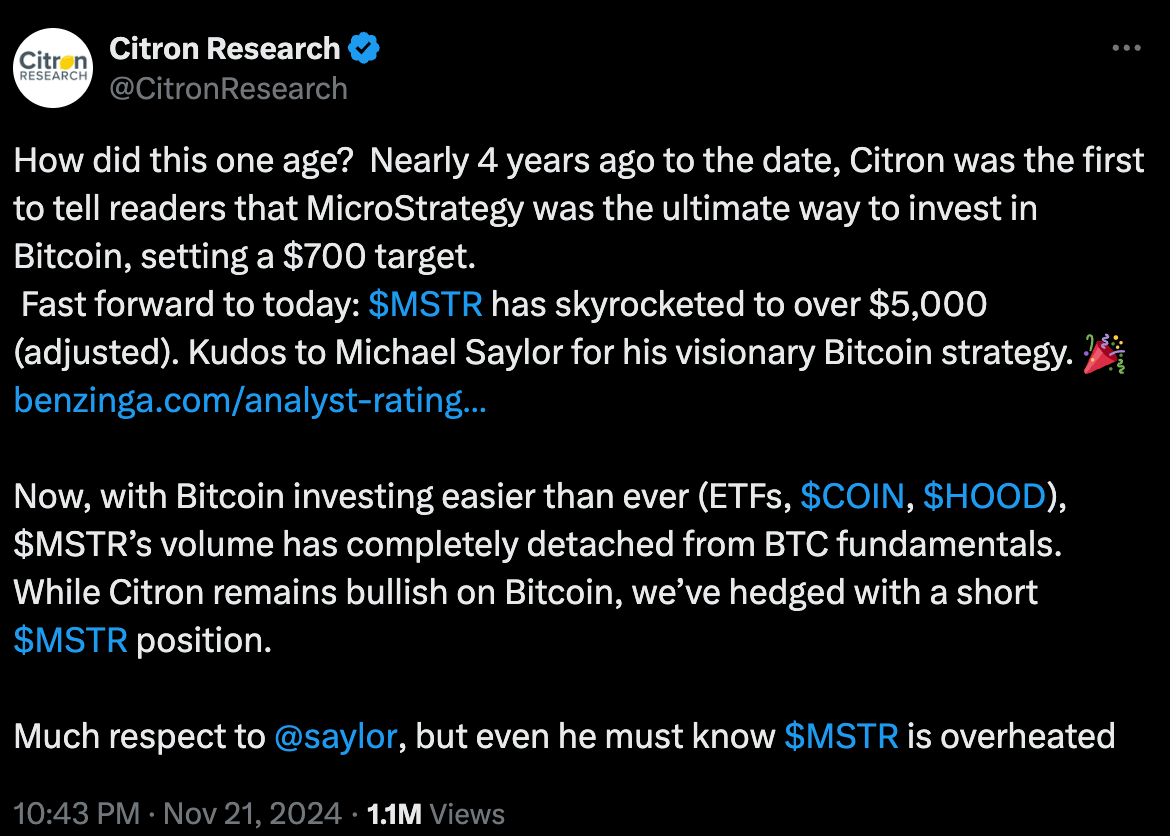BTC continues to rise, MicroStrategy becomes the strongest U.S. stock.
Written by: shaofaye123, Foresight News
On November 21, Citron Capital tweeted that it was shorting MicroStrategy stock. On one side is a Wall Street legendary short-seller, and on the other is the strongest U.S. stock of 2024. Is Citron Capital going to lose again? This article takes you through the past of these two legendary companies.
Citron, a giant in short-selling, has been a remarkable presence in the capital markets, appearing in multiple cycles. In 2012, it shorted Qihoo and Sohu, damaging their reputations. In 2021, it was forced to cover its short position on GameStop, and in 2022, it shorted Ethereum, which had a market value of $130 billion.
Since Citron Capital announced its short position on MicroStrategy yesterday, the stock price of MicroStrategy has fallen, dropping 30% from its daily high at one point.
Citron Capital's Short-Selling History
Citron Capital, a significant short-selling institution in the U.S., was founded in 2001. Over six years, it targeted 20 Chinese concept stocks, leading to a drop of over 80% in 15 of them and 7 delistings. At that time, Citron was thriving and began shorting Evergrande. In its report, it stated, "The outcome for Evergrande is already determined; only the timing is uncertain." Ultimately, Evergrande collapsed, confirming Citron's prediction.
For a time, Citron was unstoppable. In 2021, GameStop entered the sights of major short-sellers. GameStop, as the world's largest video game retail chain, was being abandoned by the market, with major companies seizing its market share. It seemed that the shorts would win again. However, the emergence of "Roaring Kitty" led to an exciting short squeeze on Wall Street. The identity behind "Roaring Kitty" is Keith Gill, but at the time, no one knew. With the influence of "Roaring Kitty" and WSB, retail investors drove the stock price from $19.95 to a peak of $39.91. Seeing the severely overvalued stock price, Citron couldn't sit still. On January 19, it officially launched a short report on GME, calling retail investors who bought at high prices "fools." Retail investors retaliated, and with Elon Musk tweeting "Gamestonk!", the stock price surged to $483. In this battle, Citron lost 100%, covering its position at $90, while another firm, Melvin Capital, lost as much as $6.8 billion.
After this incident, Citron announced that it would abandon its 20-year short-selling research, stop publishing short reports, and shift its focus to providing long trading opportunities for individual investors, seemingly marking the end of the short-selling institution era. Major capital firms were defeated, and it seemed that retail investors had achieved a final victory over Wall Street, but Robinhood's decision to pull the plug caused the stock price to plummet. In the end, the GME incident was still a victory for a few.
Afterward, Citron did not stop short-selling as it claimed. In 2022, it initiated a short position on Ethereum, which had a market value of $130 billion, and now Ethereum's market value has tripled.

The Strongest U.S. Stock of 2024: MicroStrategy
MicroStrategy, a company even more legendary than Citron Capital, is a top-tier scheme.
MicroStrategy was founded in 1989 by Michael Saylor, Sanju Bansal, and Thomas Spahr. Initially, MicroStrategy was just a consulting firm focused on multidimensional modeling and simulation. In his youth, Saylor was not optimistic about Bitcoin and even mocked virtual currencies in 2013. However, starting in 2020, MicroStrategy began exploring alternative assets beyond cash, purchasing over 21,000 Bitcoins with its financial assets, gradually becoming the largest publicly traded holder of Bitcoin in the world. MicroStrategy systematically invested heavily in Bitcoin, including taking on debt to increase its Bitcoin holdings. In just two years, it has become the publicly traded company with the most Bitcoin, with paper profits exceeding $15 billion, and trading volume surpassing Nvidia's peak on the same day.
So what is MicroStrategy's strategy? How does it leverage massive profits?
In simple terms, MicroStrategy is currently a company that specializes in purchasing BTC. By buying Bitcoin, it drives up the price of Bitcoin, which in turn raises its own stock price. It then takes on more debt to buy Bitcoin, causing the price to soar again, further increasing its stock price, and financing to purchase even more Bitcoin, leading to a continuous rise in its stock price, net asset value, and earnings…
This flywheel model inevitably brings to mind Luna, whose collapse still haunts many. Additionally, MicroStrategy currently has a 300% premium on Bitcoin, meaning MSTR investors are effectively paying $250,000 for each Bitcoin, while the market price is still under $100,000. Its stock price also carries a certain premium.
Shorting: Win or Lose?
In this context, Citron Capital has once again taken action, tweeting on November 21:
"Nearly four years ago, Citron was the first to tell readers that MicroStrategy (MSTR) was the ultimate way to invest in Bitcoin, setting a target of $700.
Fast forward to today: MSTR has soared to over $5,000 (adjusted). Hats off to Michael Saylor for his visionary Bitcoin strategy.
Now, as Bitcoin investment has become easier than ever, MSTR's trading volume has completely detached from Bitcoin's fundamentals. While Citron remains bullish on Bitcoin, we have hedged our position by shorting MSTR.
We have great respect for Saylor, but even he must know that MSTR is overheated."

In fact, Citron is not the first to suggest hedging bullish Bitcoin positions by shorting MSTR. In March of this year, another well-known firm, Kerrisdale Capital Management, made a similar suggestion, stating that it wanted to go long on Bitcoin but short MSTR stock.
Short-sellers have taken action again, and MicroStrategy's stock price has responded by falling. Is it another Hunter family or a continued rise? Is it market foresight or another misstep?
From the data, MSTZ (the 2x inverse short MSTR ETF) saw its trading volume rise on November 21, with daily trading volume approaching $1.53 billion, compared to an average daily trading volume of $84 million previously. From a fundamental perspective, MicroStrategy currently has a 300% premium on Bitcoin, coupled with the convenience of purchasing BTC after the ETF approval. In the long run, MSTR may have lost its "uniqueness premium."
However, there are still many supporters (source: @0x_Todd) who are optimistic about MSTR, stating:
- MicroStrategy is not Luna; its safety cushion is much thicker. According to recent statistics, MicroStrategy's average cost for Bitcoin is $49,874, currently close to a floating profit of 100%, which is an extremely thick safety cushion.
- MicroStrategy increases its Bitcoin holdings through bonds and stock sales. MicroStrategy borrows through over-the-counter leverage, with no liquidation mechanism. Angry creditors can at most convert their bonds into MSTR stock at a specified time and then angrily dump them into the market.
- The next debt repayment date is in 2027, which is still over two years away. Even if MSTR were to crash to zero, it would not need to be forced to sell these Bitcoins, as the earliest debt repayment date for MicroStrategy is in February 2027.
- The only soft threat currently is Bitcoin whales, and the whales prefer a win-win situation.
So, is MicroStrategy's aggressive selling of Bitcoin a spiral strategy that ultimately drives its market value to a trillion, or is it a dance that will eventually come to an end? Time will tell.
免责声明:本文章仅代表作者个人观点,不代表本平台的立场和观点。本文章仅供信息分享,不构成对任何人的任何投资建议。用户与作者之间的任何争议,与本平台无关。如网页中刊载的文章或图片涉及侵权,请提供相关的权利证明和身份证明发送邮件到support@aicoin.com,本平台相关工作人员将会进行核查。




